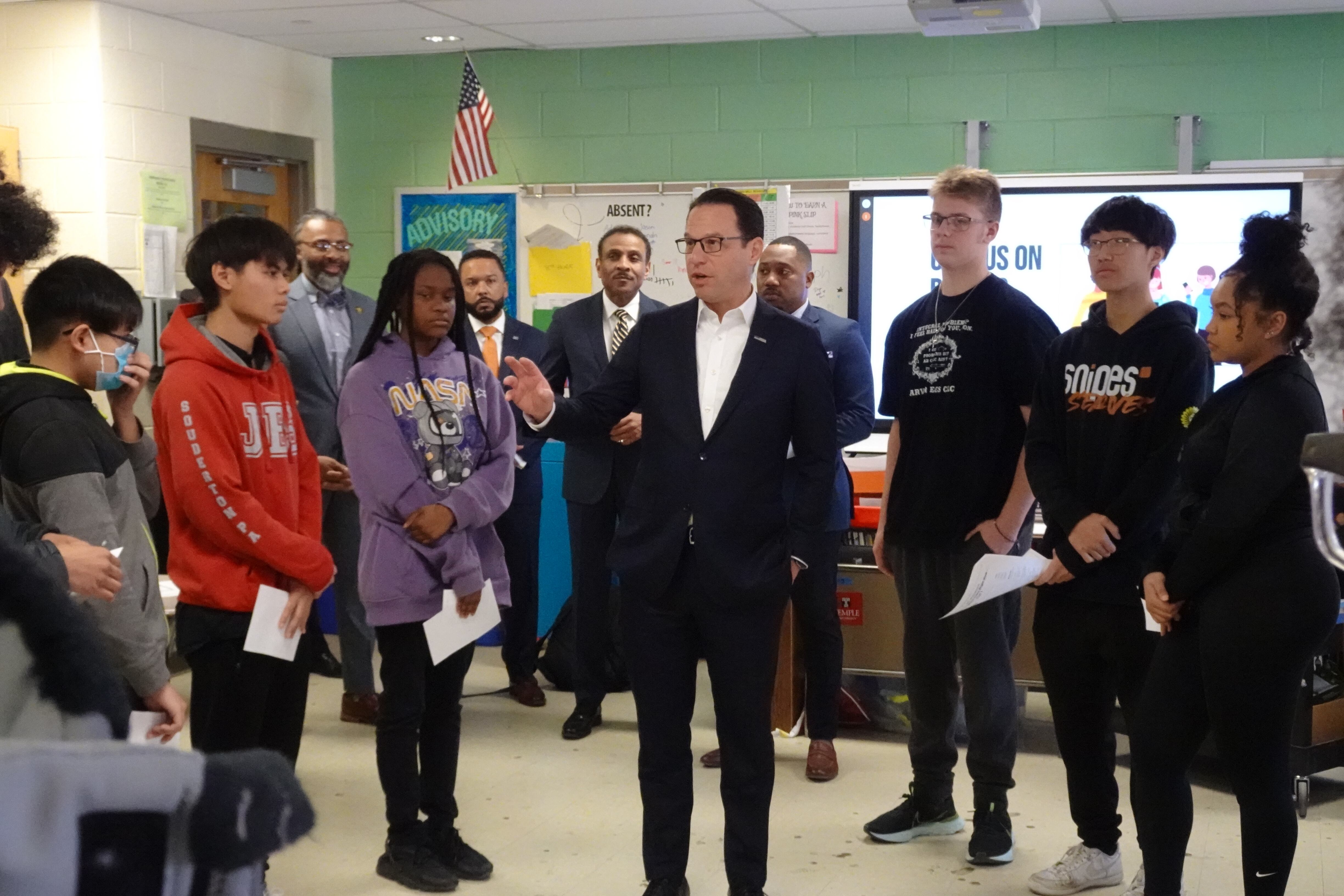Josh Shapiro, in his first visit to a Philadelphia public school since becoming governor in January, touted his plan to address Pennsylvania’s teacher shortage and said his proposed budget would make a historic investment in education.
In a two-hour visit Wednesday morning to Carver High School of Engineering and Science in North Philadelphia, Shapiro highlighted his plan to use tax credits to encourage more teachers to enter and remain in the profession. He also spent a good deal of his time engaging with students, who weren’t afraid to challenge him on his safety plan to hire more police officers.
Wednesday’s visit is part of Shapiro’s statewide tour to sell his big-picture policy and budget priorities, but the students wanted to talk about safety. In Philadelphia, 78 school district students have been shot this academic year, 17 of them fatally. Carver is in North Philadelphia, one of the neighborhoods most impacted by gun violence.
Shapiro, a Democrat, visited teacher Ian Doreian’s classroom, where 12th graders were mentoring ninth graders through the Peer Group Connection program. He told the students he thinks one solution for gun violence is to increase law enforcement’s presence in their neighborhoods and schools — a strategy used recently by Superintendent Tony Watlington.
But Black students in the room were skeptical about that idea.
“I feel like the issue isn’t to hire more police officers,” said Maniyah Jackson, a ninth grader. “A lot of these police officers, they go through training, but when they step on the street, they forget all their training and base their authority on their emotions instead of sticking to what they’re supposed to do for our community.”
“I feel more safe with a firefighter than I do with police officers,” 12th grader Taniya Son also told Shapiro. “There’s been incidents where it’s like, they’ve been so aggressive towards us for no reason.”
Shapiro said, “I’m sensitive to that … I look the way I do and I don’t necessarily feel that way.”
He thanked the students for their forthrightness and honesty. “That’s a hard thing to speak up and say to the governor,” he said.
He even suggested legislation mandating more comprehensive training of police officers and beefing up after-school programs in community spaces, including firehouses. “I’ll call it Taniya’s Law,” he said.
Shortly after his meeting with the students, a press release from Shapiro’s office noted the governor is heading to Lackawanna College Police Academy in Scranton on Thursday to discuss his proposal to recruit more police officers in the state.
Shapiro was joined at the school by Board of Education President Reginald Streater, Vice President Mallory Fix-Lopez, Watlington, and other district officials. City Council President Darrell Clarke, state Rep. Donna Bullock, and state Sens. Sharif Street and Vincent Hughes also attended. Mayor Jim Kenney made an appearance but didn’t make public remarks.
Shapiro’s proposed budget includes a refundable tax credit of up to $2,500 annually for up to three years for newly certified Pennsylvania teachers, including those just graduating with their certifications and those who relocate from other states.
In total, Shapiro said his budget includes $24.7 million in “job retention and recruitment efforts” for teachers, nurses, and law enforcement personnel.
Pennsylvania is suffering from a major teacher shortage. A decade ago, 20,000 people annually earned their teaching certifications. That number dropped to 6,000 in 2022. Philadelphia opened the school year with more than 200 teacher vacancies, and last month the school board approved more than 100 teacher resignations and retirements, most of them since September.
Shapiro’s proposed budget adds more than $1 billion to education programs. It increases the state’s basic education subsidy by $567 million, but also sets aside additional money for specific needs, including mental health counselors and infrastructure improvement.
Shapiro said his proposal would be a “down payment on the future of education.”
“When I spoke in my budget address, I made clear that this will not happen overnight,” Shapiro said, adding later that “we would have to work on this over two budget cycles.”
When he unveiled his budget earlier this month, Shapiro tied it directly to a historic ruling last month in a landmark school funding case from Commonwealth Court Judge Renée Cohn Jubelirer. In that ruling, Jubelirer said the Commonwealth’s system for funding education is unconstitutional because it is neither adequate in total or equitably distributed. Jubelirer ordered state officials to revamp the system.
Shapiro said that “by all indications there are no plans” from Republican legislative leaders to appeal Jubelirer’s ruling. A spokesman for House Republican leadership said Wednesday that while GOP lawmakers are not focused on appealing the ruling at the moment, “post-trial motions have been briefed and filed. No final decision can be made on an appeal until we see the results of those motions.”
Other officials, including Hughes, have called for an even larger investment in education than Shapiro. With the governor standing next to him, Hughes called Shapiro’s proposal “a great start.”
When speaking to students in Doreian’s classroom, Shapiro recounted his own journey to them. Originally, he wanted to be a doctor, like his father, but he flunked a test in his pre-med program — on the same day he was cut from the basketball team. He became a lawyer and politician instead because that was also an avenue to “help people,” he told them.
“Don’t be afraid to strike out, like I did,” he said.
Jacky Wang, a 12th grader, asked Shapiro a question on many people’s minds: whether he has aspirations for higher office.
Shapiro smiled and said, “This is all I’m focused on.”
Dale Mezzacappa is a senior writer for Chalkbeat Philadelphia, where she covers K-12 schools and early childhood education in Philadelphia. Contact Dale at dmezzacappa@chalkbeat.org.
Carly Sitrin is the bureau chief for Chalkbeat Philadelphia. Contact Carly at csitrin@chalkbeat.org.





